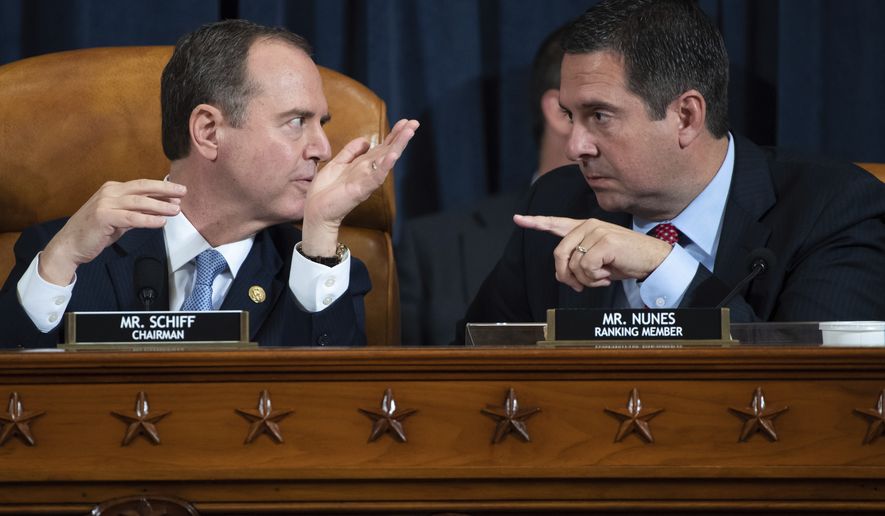OPINION:
That beauty is in the eye of the beholder goes without saying. A reminder may be needed, though, that meaning is in the ear of the listener. That’s because words filtered through an inner universe of preconceived notions can wind up appallingly distorted. Americans judging the words of presidential impeachment witnesses must focus on firsthand facts and discard prejudiced opinions fashioned from the biases of President Trump’s detractors.
Wednesday marked the beginning of the process in which the president’s accusers, done testifying in secret, face public scrutiny. The first tattler was U.S. diplomat William B. Taylor, recollecting events that triggered Democrats’ charges that Mr. Trump attempted to establish an illicit “quid pro quo” by entreating Ukrainian President Volodymyr Zelensky during a July 25 phone call to investigate Democratic presidential candidate Joe Biden and Burisma Holdings, an energy company in which Mr. Biden’s son, Hunter, was involved, in return for U.S. military aid.
During the televised hearing, Mr. Taylor re-read his previous closed-door testimony before Rep. Adam Schiff’s Intelligence Committee. Listeners were caught in mid-yawn when he dropped a new “quid pro quo bomb” — a thirdhand allegation that U.S. Ambassador to the European Union Gordon Sondland told a staffer that Mr. Trump was more interested in the investigation of Burisma and the Bidens than in Ukrainian security.
One person recalling an attempt by a second person to gauge the mindset of a third person could nail the bull’s-eye, or it could miss by a mile. Scuttlebutt is like that.
Mr. Taylor was hemmed in by the contents of his printed transcript of his testimony. In it, he had fashioned a quid pro quo case against the president on a flimsy foundation: “That was my clear understanding, security assistance money would not come until the President [of Ukraine] committed to pursue the investigation.”
The source of the diplomat’s “clear understanding?” Nothing he heard firsthand. His conclusion was only based on conversations with other officials involved in U.S. relations with the Eastern European nation — all from his recollections of who said what to whom, and when it was said and where it was said.
“With all due respect, ambassador, your understanding was wrong,” observed Republican Rep. Jim Jordan in defense of the president.
Mr. Taylor’s closed-door testimony named Mr. Sondland as the source of his belief that Mr. Trump wanted to condition U.S. aid on Ukraine’s agreement to investigate the Bidens and Burisma. “That’s what Ambassador Sondland said,” Mr. Taylor testified. “He said that they were linked.”
During his own audience with the secret proceedings, Mr. Sondland initially stood by his text message sent to Mr. Taylor disputing the linkage between investigation and aid: “The President has been crystal clear no quid pro quo’s of any kind.” Later, he pulled an about-face, claiming, “I now recall” telling a Ukrainian official about the purported quid pro quo. Documents can be folded, spindled and mutilated. Apparently, so can memories.
George Kent, deputy assistant secretary of State for European and Eurasian affairs, shared the witness table with Mr. Taylor Wednesday and recalled warning the vice president’s office that Hunter Biden’s presence on Burisma’s board at a time when his father was overseeing U.S.-Ukrainian relations risked the perception of a conflict of interest. The upshot? A shoulder shrug — a curious lack of curiosity — in stark contrast to grave concern over the president’s every murmur.
While some communications with bearing on the current dump-Trump campaign have been subject to manipulation, others require no interpretation: “#coup has started. First of many steps. #rebellion. #impeachment will follow ultimately.” The jarring tweet was reportedly posted in January 2017 by Mark Zaid, attorney for an anonymous whistleblower-leaker who triggered the Democrats’ impeachment inquiry.
Additional witnesses are lining up like artillery shells in Mr. Schiff’s impeachment offensive, ready to opine on the presidents’ phone discussion and related rumors. Nothing they share is closer to the meaning of the dialogue than the phone transcript, which contained no promise of “this for that.”
Republicans have assembled their own list of witnesses, including Hunter Biden, fellow Burisma board member Devon Archer and several other key players in the scheme to flip the script and criminalize the president’s efforts to uncover corruption in Ukraine. Alas, Chairman Schiff has barred any witness who would refute his impeachment designs.
Mr. Trump has characterized his Zelensky phone call as “perfect.” He may be guilty of exaggeration, but which politician isn’t? Only sufferers of Trump Derangement Syndrome see the president’s actions as a crime worthy of impeachment.




Please read our comment policy before commenting.